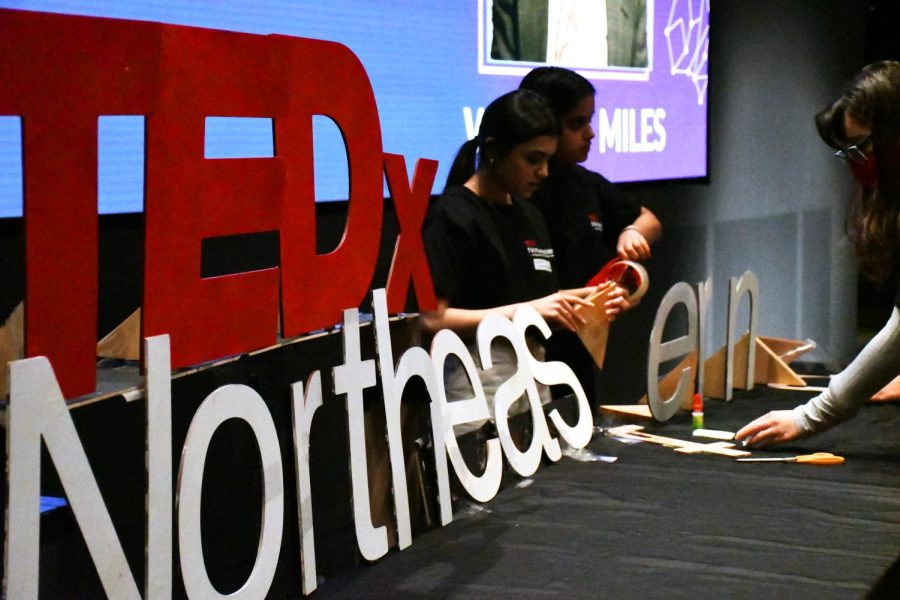‘Solve for {Y}’: Annual TEDxNortheasternU conference returns to campus
Members of the TEDxNortheasternU team set up stage in the auditorium of ISEC.
May 6, 2022
Resilience and rebuilding were strong motifs at this year’s annual TEDxNortheasternU conference April 30, marking the first in-person meeting since before the COVID-19 pandemic.
Speakers from the Northeastern community and beyond shared their personal take on the central theme “Solve for {Y},” with some discussing ways to better yourself as an individual and others addressing global institutional problems.
“What I’m really encouraging [the audience] to do is to search for that theme and the answers that you might come up with in the talks that you hear, in the conversations that you’re having, and be able to connect those to your personal lives,” said Mansi Sharma, a third-year business administration major and the co-president of TEDxNortheasternU, in her introduction to the event.
TEDxNortheasternU is a branch of the TEDx program, where anyone can host TED-style talks in their local communities, following the same format as traditional TED talks, but organized independently. Northeastern’s club has been hosting speakers with “ideas worth spreading” every year since 2018, giving Northeastern students the unique opportunity to attend an in-person TED conference, which might be otherwise inaccessible, while surrounded by the rest of their community.
“You get to share this experience with a room full of curious people. … This event is just as much about the person sitting next to you as it is about the person on stage,” said Derrick Tong, a third-year business administration major and the co-president of TEDxNortheasternU, in his introduction.
Months prior to the event, TEDxNortheasternU members began selecting speakers and organizing the event.
“It’s an incredibly long and winding process to plan and host any TEDx event. It takes months of planning with help from a dedicated group of planners,” Tong wrote in an email statement to The News. “It often surprises people how much time and effort goes into planning a TEDx event that lasts only a few hours.”
At the event, the attendees — including current students, alumni and staff — heard from eight speakers who submitted their topics or were nominated to speak at the event.
Some of these speakers addressed specific institutional issues that their personal work had helped them understand and shared how attendees could make a difference in these causes.
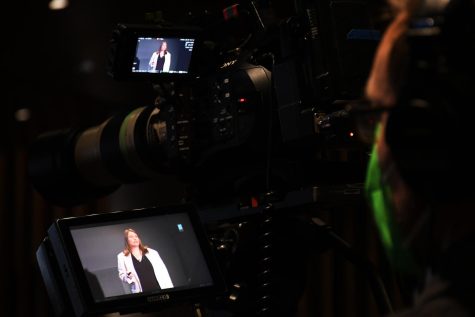
Northeastern professor and co-founder of the Environmental Data and Governance Initiative Sara Wylie explained how to challenge the “colonial mindset” in environmental justice. She described a system with reciprocity and accountability networks, specifically focusing on removing the “Halliburton Loophole” in fracking laws and encouraging the use of the three sister crops — corn, beans and squash — in agriculture.
“Are settler societies able yet to see the benefit of these kinds of complementary relationships and begin actively designing now to support ethical, social and environmental relationships?” Wylie said in her speech. “I argue this is possible, and we can begin to do it by designing for reciprocity, accountability, consent and trust.”
Manya Chylinski is a mental health advocate who works in bringing awareness to the mental and emotional wounds inflicted by large-scale trauma. She took the event as an opportunity to discuss her experience witnessing the Boston Marathon bombing up close and explain how the government and healthcare systems failed to help her with her post-traumatic stress disorder, and how she hopes institutions can change in the future to address these gaps.
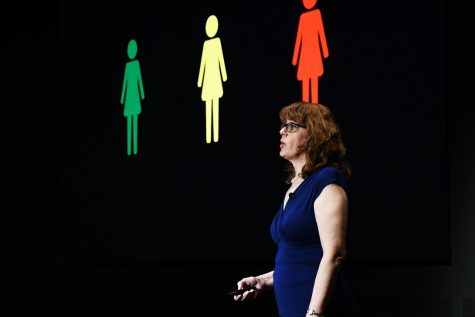
“I want people to understand the need for compassion for all types of survivors, and I’m working to change the system at a structural level,” Chylinkski said in her talk. “Most of us get the need for compassion, and systems and institutions are made up of people just like you and me. So why doesn’t that compassion and empathy we feel for the people in our lives extend to these systems?”
Other speakers brought a wider lens to the theme, discussing general large-scale problems and ways that they can be fixed. Beth Noveck, an author and Northeastern professor who directs the Burnes Center for Social Change, bridged the gap between the personal and institutional levels in her talk about how to teach individuals problem-solving skills that can be applied to broad social issues.
“Instead of assuming that social innovators are born, or somehow magically birthed whole cloth as creative leaders, I believe social impact is learnable,” Noveck said in her talk. “We can enable anyone and everyone to master the skills of public problem-solving in their own communities to become more successful at making social change happen. … We have myriad challenges that we must address now, so we urgently need to equip ourselves with the tools to do so.”
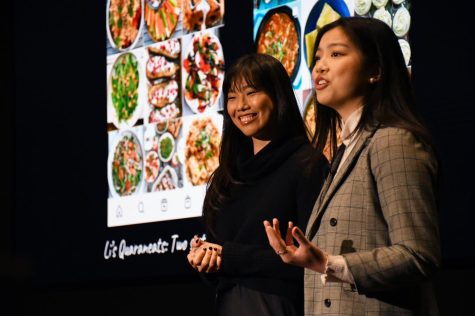
In another talk about connecting with and helping local communities, sisters and Northeastern alumni Karen and Winnie Li took the stage to talk about their quarantine food Instagram account, @QuaranEATS, where they have shared recipes and cooking basics since the start of the pandemic. They discussed how they have been able to use this platform to connect with individuals from around the world and raise money for causes they are passionate about, including Off Their Plate and Stop AAPI Hate.
“It’s not always just about the food, but it’s about the people and the impact it can have on bringing people together to create even greater changes,” Winnie Li said in the siblings’ talk.
Other speakers looked inwards, with talks focusing on solving internal problems or answering a personal “why” question. One such speaker was Beth Kennedy, a leadership coach and author who addressed career burnout and how to handle it — namely, focusing on well-being, being self-aware, innovating in your career, curating a personal brand and connections to others.
Kennedy explained how her personal experiences with burnout had helped her develop a system to become more resilient. Similarly, Northeastern professor William Miles talked about how his personal experience of being rejected from law school gave him the freedom to explore, joining the Peace Corps in Niger and teaching students English.
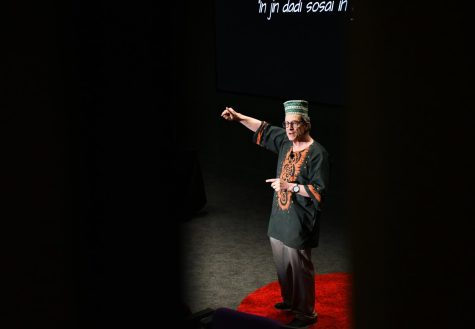
“Rejection is not an end — it can be a beginning, a better beginning. I still get rejections … and I still get that pit in my stomach, that self-doubt, that feeling of failure when those rejections come in. But I always try to remind myself that what you first feel as the ultimate rejection … can be the best thing that ever happened to you. It can lead to greater opportunities and eventually have a positive impact on other peoples’ lives,” Miles said.
Hazel Sive, a Northeastern professor and the dean of the College of Science, took a more literal approach with her talk about the composition of the human body, containing trillions of individual cells. She focused on the ways these cells can be modified both now and in the future to treat diseases and repair damages.
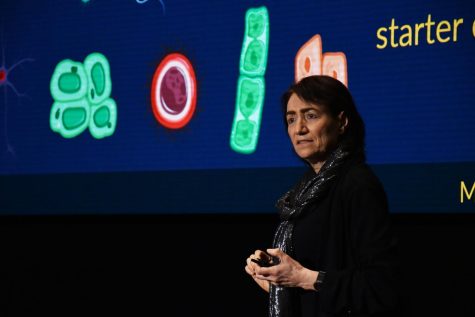
“[My class] talked about cancer immunotherapy, where cells could be changed to target and kill a tumor. We talked about how scientists have painstakingly been able to build cells in the lab that can produce insulin, pancreatic beta cells, and how these … will go ahead to help people with certain types of diabetes,” Sive said. “Scientists can build little bits of kidneys and those little bits are being really useful to understand how kidney disease works. … And we talked about crazy things like 3D printing with cells that can build tiny blood vessels that someday can be used to help people with vascular disease.”
No matter the exact topic of these talks, each focused on the theme of solving problems, presenting actionable solutions and steps forward for the attendees. The co-director of speakers at TEDxNortheasternU, second-year political science and economics combined major Alexa Kalach, said in an interview that the theme “Solve for {Y}” gave speakers an opportunity to share their passions. The speakers team helped guide the speeches to reflect this theme.
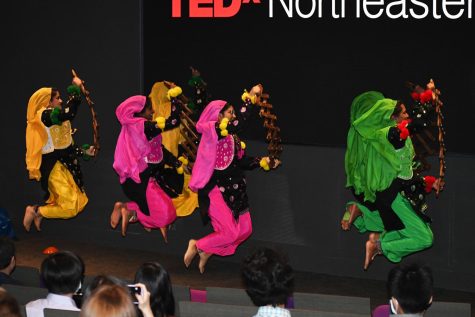
Organizers and speakers alike said they hope that Northeastern students and other attendees would be able to take the lessons learned at this event and apply them to their personal lives.
Co-president Sharma said her favorite part of the event is the energy that the entire TEDxNortheasternU team brings, and she also enjoys seeing it pay off at the end of the process.
“The second best part is when attendees come up to us, and tell us how much the event impacted them. The great thing about TEDx events are that the speakers are people who you can somewhat relate to given that you’re in the same community,” Sharma wrote in a statement to The News. “That said, you’re able to see their different perspective and experience, but we make sure to mention some life lessons that are broad enough to make them relate to anyone.”


